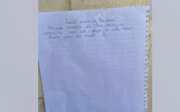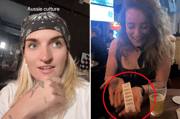‘Too good to be true’? Weight-loss scam tricks Aussies with fake endorsements
- Replies 0
Online shopping has made life easier for many of us—no more battling the crowds, no more standing in long queues, and you can browse in your pyjamas with a cuppa in hand.
But as the internet becomes our go-to for everything from groceries to the latest health trends, a new and dangerous scam is targeting Aussies, especially those looking for a little help with weight loss.
Online ‘ghost stores’ pretending to be Australian businesses have branched out into marketing Ozempic-style weight-loss products, even going so far as to impersonate real people, including a prominent dietitian, to back their claims.
Following a discovery of over 140 scam websites falsely presenting themselves as local fashion retailers, which led to a public warning from the consumer watchdog, Guardian Australia has now uncovered a fresh scam aimed at Australians trying to lose weight.
Consumer advocates warn that this new scam poses more than just a financial risk—it could endanger people’s health.
Dietitian Lyndi Cohen revealed her image has been used without permission to promote a product she would ‘never endorse’.

One example involved a Facebook page named ‘Emma Davis’, claiming to be a ‘team of specialist in diabetes care and weight management’ based in New South Wales. The page ran ads for what it described as a ‘GLP-1 plant based oral solution’.
GLP-1 is a hormone the body produces naturally to regulate appetite and blood sugar.
Since the rise in popularity of medications like Ozempic and Mounjaro, online sellers—including some appearing legitimate—have flooded the market with supplements, pills, and patches claiming to replicate GLP-1 effects.
The ad featured a glowing testimonial signed off by ‘Helen, 68, Sydney’, calling the product ‘one of the best gifts I’ve given myself in years’.
It also displayed supposed ‘before and after photos’ that appeared to be generated by AI.
The post made bold claims, stating the product was ‘perfect’ for people with ‘big appetites’ or ‘anyone who’s tried GLP-1 drops or injections without much result’.
Its comments section was filled with what seemed to be enthusiastic endorsements from women who appeared Australian.
But a closer look at the profiles told another story.
Reverse image searches suggested many were fake, with stolen photos, including one of Polish war correspondent Agnieszka Pikulicka-Wilczewska, which was used to create a profile for a supposed Gold Coast woman named ‘Isla Taylor’.
Pikulicka-Wilczewska confirmed the image was hers and said she was unaware of its use. ‘Obviously, the account in question should remove it asap and should not use it again,’ she told Guardian Australia via email.
Another supposed profile, claiming to be a blonde woman from Canberra, used photos of three separate women, including an Ohio newspaper columnist and a former US TV personality.
The ad directed users to Maementcurves.com, a website still live as of Friday. The weight-loss product page appeared to be taken down after Guardian Australia contacted the site for a statement.
The site promoted a product called ‘STDEI GLP-1 Weight Loss Oral Liquid’, claiming it was made in Australia by a local, family-owned business. However, the same product can be easily found online, including on AliExpress, eBay, and other similar ‘ghost stores’.
The Maementcurves.com website, masquerading as an Australian platform, even claimed the treatment had saved a customer’s life—someone who was ‘seriously obese and close to death’—and said it was ‘especially endorsed by Lyndi Cohen, one of Australia’s leading dietitians’.
Cohen confirmed she was aware of the website’s use of her image and said her name was ‘being abused and misrepresented’ to promote a product she would ‘obviously not endorse’.
‘We sent them a cease and desist letter. We have not heard back. For me, the challenge is: I don’t know how to action it,’ she said.
‘It feels like international waters in a way, there’s no jurisdiction. Whose job is it to control and manage this?’
Source: 9 News Australia / Youtube.
So, what can you do to stay safe? Here are some tips to help you avoid falling victim to these scams:
1. Check the Website: Look for an Australian Business Number (ABN), a physical address, and contact details. If these are missing or seem dodgy, steer clear.
2. Be Wary of Celebrity Endorsements: If a product claims to be endorsed by a well-known Aussie, check their official website or social media to see if it’s true.
3. Look for Genuine Reviews: Fake reviews often use stock photos or stolen images. Search for independent reviews on trusted sites.
4. Use Secure Payment Methods: PayPal and credit cards offer some protection, but always check the seller’s reputation.
5. Report Suspicious Sites: If you come across a ghost store, report it to Scamwatch and your bank.
Read more: Is your online shopping safe? Experts say ghost stores are on the rise in Australia

Have you or someone you know been targeted by an online scam? Have you seen suspicious ads for weight loss products on social media? Share your experiences in the comments below!
But as the internet becomes our go-to for everything from groceries to the latest health trends, a new and dangerous scam is targeting Aussies, especially those looking for a little help with weight loss.
Online ‘ghost stores’ pretending to be Australian businesses have branched out into marketing Ozempic-style weight-loss products, even going so far as to impersonate real people, including a prominent dietitian, to back their claims.
Following a discovery of over 140 scam websites falsely presenting themselves as local fashion retailers, which led to a public warning from the consumer watchdog, Guardian Australia has now uncovered a fresh scam aimed at Australians trying to lose weight.
Consumer advocates warn that this new scam poses more than just a financial risk—it could endanger people’s health.
Dietitian Lyndi Cohen revealed her image has been used without permission to promote a product she would ‘never endorse’.

Online scammers are impersonating legitimate Australian businesses and individuals, including dietitians, to promote and sell fake Ozempic-like weight loss products through 'ghost stores' and fake reviews. Image source: Haberdoedas / Unsplash.
One example involved a Facebook page named ‘Emma Davis’, claiming to be a ‘team of specialist in diabetes care and weight management’ based in New South Wales. The page ran ads for what it described as a ‘GLP-1 plant based oral solution’.
GLP-1 is a hormone the body produces naturally to regulate appetite and blood sugar.
Since the rise in popularity of medications like Ozempic and Mounjaro, online sellers—including some appearing legitimate—have flooded the market with supplements, pills, and patches claiming to replicate GLP-1 effects.
The ad featured a glowing testimonial signed off by ‘Helen, 68, Sydney’, calling the product ‘one of the best gifts I’ve given myself in years’.
It also displayed supposed ‘before and after photos’ that appeared to be generated by AI.
The post made bold claims, stating the product was ‘perfect’ for people with ‘big appetites’ or ‘anyone who’s tried GLP-1 drops or injections without much result’.
Its comments section was filled with what seemed to be enthusiastic endorsements from women who appeared Australian.
But a closer look at the profiles told another story.
Reverse image searches suggested many were fake, with stolen photos, including one of Polish war correspondent Agnieszka Pikulicka-Wilczewska, which was used to create a profile for a supposed Gold Coast woman named ‘Isla Taylor’.
Pikulicka-Wilczewska confirmed the image was hers and said she was unaware of its use. ‘Obviously, the account in question should remove it asap and should not use it again,’ she told Guardian Australia via email.
Another supposed profile, claiming to be a blonde woman from Canberra, used photos of three separate women, including an Ohio newspaper columnist and a former US TV personality.
The ad directed users to Maementcurves.com, a website still live as of Friday. The weight-loss product page appeared to be taken down after Guardian Australia contacted the site for a statement.
The site promoted a product called ‘STDEI GLP-1 Weight Loss Oral Liquid’, claiming it was made in Australia by a local, family-owned business. However, the same product can be easily found online, including on AliExpress, eBay, and other similar ‘ghost stores’.
The Maementcurves.com website, masquerading as an Australian platform, even claimed the treatment had saved a customer’s life—someone who was ‘seriously obese and close to death’—and said it was ‘especially endorsed by Lyndi Cohen, one of Australia’s leading dietitians’.
Cohen confirmed she was aware of the website’s use of her image and said her name was ‘being abused and misrepresented’ to promote a product she would ‘obviously not endorse’.
‘We sent them a cease and desist letter. We have not heard back. For me, the challenge is: I don’t know how to action it,’ she said.
‘It feels like international waters in a way, there’s no jurisdiction. Whose job is it to control and manage this?’
Source: 9 News Australia / Youtube.
So, what can you do to stay safe? Here are some tips to help you avoid falling victim to these scams:
1. Check the Website: Look for an Australian Business Number (ABN), a physical address, and contact details. If these are missing or seem dodgy, steer clear.
2. Be Wary of Celebrity Endorsements: If a product claims to be endorsed by a well-known Aussie, check their official website or social media to see if it’s true.
3. Look for Genuine Reviews: Fake reviews often use stock photos or stolen images. Search for independent reviews on trusted sites.
4. Use Secure Payment Methods: PayPal and credit cards offer some protection, but always check the seller’s reputation.
5. Report Suspicious Sites: If you come across a ghost store, report it to Scamwatch and your bank.
Read more: Is your online shopping safe? Experts say ghost stores are on the rise in Australia
Key Takeaways
- Online scammers are impersonating legitimate Australian businesses and individuals, including dietitians, to promote and sell fake Ozempic-like weight loss products through 'ghost stores' and fake reviews.
- The scam poses risks beyond financial loss, as products are being falsely endorsed and offered with misleading health claims, making it a serious danger to consumer health.
- Digital platforms like Facebook, Shopify, and PayPal are being criticised by consumer advocates for allowing these scams to proliferate, with calls for them to be held accountable and penalised for hosting and enabling fake ads and transactions.
- The ACCC and consumer advocates urge people to report scam websites to Scamwatch and call for a systemic crackdown on online fake stores, rather than trying to tackle each scam individually.
Have you or someone you know been targeted by an online scam? Have you seen suspicious ads for weight loss products on social media? Share your experiences in the comments below!







